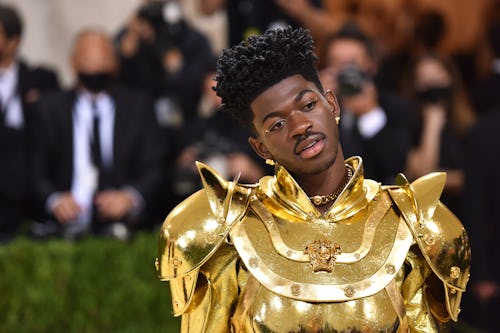
The first song on Lil Nas X’s debut album, Montero, is appropriately the chart-topping track of the same name “Montero (Call Me By Your Name)” — a shared title that is also, appropriately, the pop star’s real first name. This record is our formal introduction to the star known as Lil Nas X, even if calling it an intro at this point is a paradox. But most importantly, it's part of what makes him among our most exciting, radical pop stars in recent memory.
Despite this being his debut album, we’ve all known Lil Nas X for some time. He became the definition of an overnight success in 2019, when as an unknown 19-year old he spammed the internet with “Old Town Road,” and turned it into the longest-running Billboard No. 1 song of all time. Since then, particularly with his lead singles and the promotional efforts leading up to this record, nobody has managed to hold the internet in the palm of his hand the way he has.
But naming the album after the real person outside of the artistic persona — unabashedly queer, a wickedly funny troll borne of Nicki Minaj standom, a genre-bending rapper/singer who proudly wears his youthful uncertainty on his sleeve — is fitting for what is an uneven, but nonetheless remarkable record about affirming one's own life and sense of self against all odds. On Montero, Lil Nas X offers a pleasurable bounty of the pop rap that helped build his stardom, while also allowing him to push his voice into new territories via slower, sadder melodies and some brief genre detours. Broadly, the album toggles between two modes — upbeat, irresistible trap-tinged tracks, and more strictly pop offerings filled with his melancholic singing and diaristic revelations.
The first category is how most of the opening half of the album plays out, and is what goes down the easiest. Lil Nas X does well playing with new flows, and blends seamlessly with his duet partners: “Industry Baby," the album's second single featuring Jack Harlow, remains a standout; “Scoop,” featuring Doja Cat, and “Dolla Sign Slime,” featuring Megan Thee Stallion, showcase giddily playful combos that become instant earworms.
The lion's share of production is handled by the duo Take A Daytrip, who prosper with prominent horns on songs like “Dead Right Now,” which features surprisingly emotional verses (as opposed to the slower confessional songs later on the album) and a Kanye-esque gospel choir in its chorus. The instrumental theme never tires, but rather persistently invigorates these tracks. The one flail among this stretch is “Thats What I Want,” a blandly acoustic pop track that is primed for cheesy movie montages: catchy and easily digestible, but completely stripped of an identity.
The poppy, personal cuts on the album are where Lil Nas X is most prone to faltering, but they're also his bravest moments. Much of the record’s second half turns inward, where his writing can be his greatest shortcoming but also lead to profundity. He laments love that slips from his grasp and makes sharp left turns toward the angst of pop punk (“Lost in the Citadel”) and the embitterment of sad rock (“Life After Salem”). These songs awkwardly jut out in the grand scheme of the album, but they also showcase a greater range from a star whose career was founded in genre-blurring — his vocal performance in “Life After Salem” in particular is a surprisingly effective cosplay as a grungy rockstar. Songs like “One of Me,” which closes with a tender, beautiful piano cameo from Elton John (a feature that is just about as validating of a co-sign that Lil Nas X can receive), address past haters that once cast him as a one-hit wonder.
But his responses throughout the record are less of a clapback from someone who has now undoubtedly made it; instead, Lil Nas X’s reckoning with his quick ascension is clouded by doubts and whiplash. On “Void,” he explains: “Every win gives you more room to lose / It’s too many ups and downs on the ride / I spent inordinate ‘mounts of time / Trapped in a lonely, loner life.” It’s the final line here, though, that is indicative of writing that is at once intensely earnest, but also frequently one-note in its melodrama. “Sometimes you’re angry / sometimes you’re hurting / sometimes you’re all alone / sometimes I’m anxious,” he croons on “Tales of Dominica.”

These lyrics are at times clunky and heavy-handed, but they can also be radical in their openness to document the feelings of someone who made music history just on the way out of adolescence, who chose to come out in the middle of that burgeoning stardom, and who continues to assert an openly queer and Black identity in the face of many who believe he ought to be condemned to eternal damnation. It’s this earnestness in part that makes Lil Nas X a legitimately inimitable star: one who always knows the best (and most viral) way to give an unfazed middle finger to a particular brand of hate that denies your very being, but who is also unafraid to reveal the soft heart beneath all of his cutting irony and irreverence.
While Montero periodically trips up in finding a nuanced or artful cohesion, it is also a letter of self-acceptance where the stakes couldn’t be higher. “Don’t wanna lie, I don’t want a life / Send me a gun and I’ll see the sun,” he sings on “Sun Goes Down.” It’s hard not to hear in these lines not only a sobering admission about himself, but about countless folks that see themselves in him, on the edge of a similar precipice. One can't overstate the impact of this raw honesty for someone at Lil Nas X's level of fame, and he knows it. “And I’m happy by the way / That I made the jump, that leap of faith,” he declares on "Sun Goes Down," referencing his decision to come out. “I’m happy that it all worked out for me / Ima make my fans so proud of me.” On Montero, Lil Nas X is intent on lighting a path for others, even while he's stumbling his way through the thicket himself.







